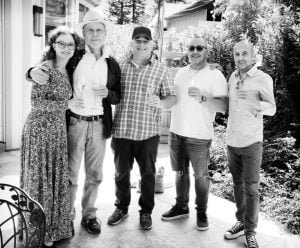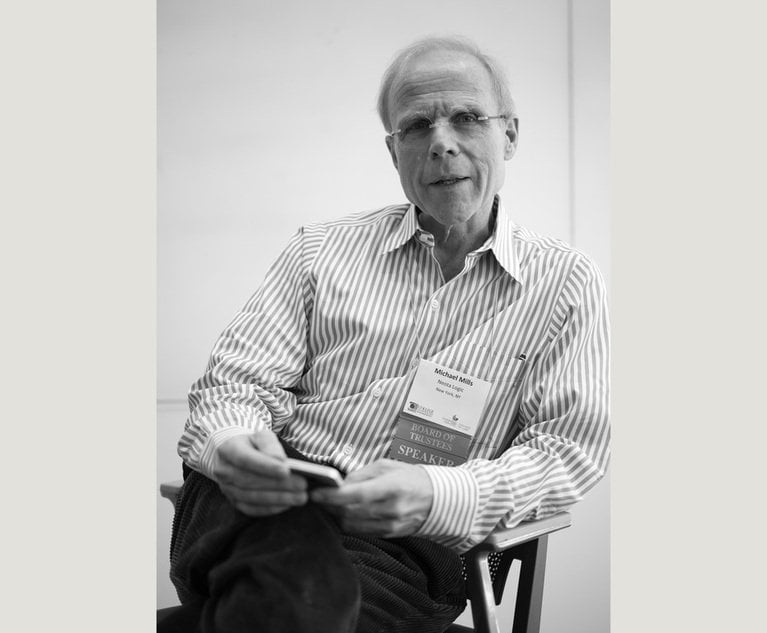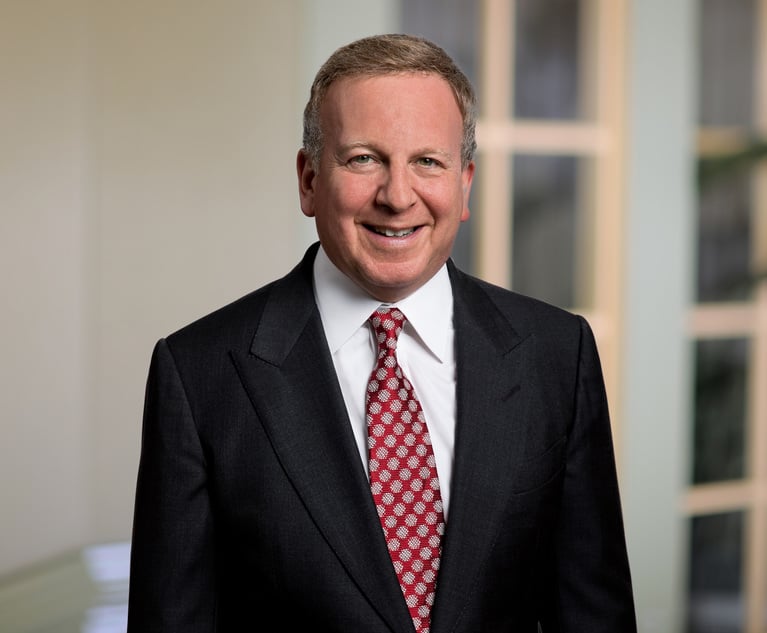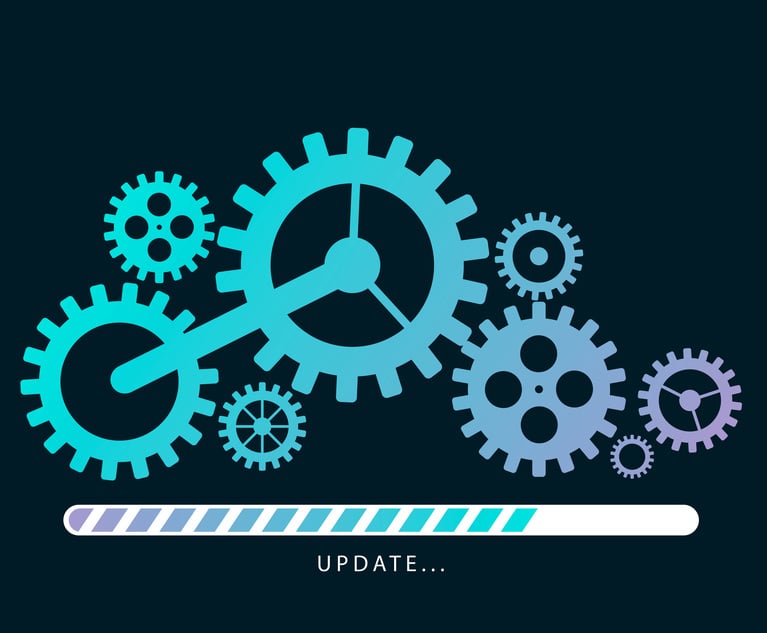Michael Mills, considered by many as one of the trailblazers of legal technology, passed away at 77 years old at his home in St. Helena, California on Oct. 1, with his partner Karen MacNeil by his side.
A part-time reporter for Portland TV news in the 1970s, turned Big Law partner, turned legal technology entrepreneur, Mills seemed drawn to little-known expeditions, with an early interest in access to justice technology, and an affinity for Italian motorcycles (particularly the Ducati). Mills made an impact on the legal tech market in many ways, most recently as the co-founder and president of no-code automation provider Neota Logic.
 Michael Mills. Credit: Jeffrey Rovner
Michael Mills. Credit: Jeffrey Rovner
His background in the industry spans five decades: Mills started as an associate at Davis Polk & Wardwell. He then served as General Counsel for the Central Park Conservatory—an organization he was a loyal donor to until the end of his life—before moving on to become a partner at Mayer Brown, and finally returning to Davis Polk as its chief knowledge officer and co-head of technology.
Those who met him throughout his life remember him with much affection, and a certain degree of awe. No matter how well one knew Mills personally, professionally, or just by name, his accomplishments in the legal field were momentous. And yet his own reflection of them was often modest—and usually kept private.
Ron Friedmann, senior director analyst at Gartner, who worked alongside Mills since the late 1980s, describes a desolate and confusing landscape for legal technologists at the time. Indeed, “you have to remember that deciding to buy a computer for lawyers was a big deal back then,” Friedmann said. As both Mills and Friedmann were taken by a nascent legal tech interest, their paths were bound to cross.
Before long, Mills would become a regular fixture at Friedmann’s Law Practice Technology Roundtable, which ran from 1991 to 2003, and comprised “20 to 25 people,” including Mills, who was then working at Davis Polk, Friedmann, “and maybe two forward-thinking CIOs,” he noted.
“[Mills] took complex problems and simplified them, which doesn’t mean the solutions were easy. Often there were complexities, but they were well-hidden from the lawyers,” Friedmann said.
Friedmann describes Mills’ clarity of thought as an indicator of his success as an early legal technologist. He recalled that, when recently asked for his opinion on coming up with the appropriate metrics to gauge law firm innovation strategies, he “put a comment in the PowerPoint, saying one potential metric [was], and this is directly from the words of Michael: ‘Does it make the lives of the partners a little bit easier?’ That was a really simple buying concept.”
A Wealth of Legal Tech Knowledge
 (from Left to Right) Mill’s partner Karen MacNeil; Michael Mills; Oz Benamram, Chief Knowledge & Innovation Officer (CKIO) at Simpson Thacher & Bartlett LLP; Joshua Fireman, President at Fireman & Company; Ali Shahidi, Managing Director for knowledge managemenet at O’Melveny & Myers. Friends visited Michael and Karen at their home in St. Helena, CA. Credit: Jeffrey Rovner
(from Left to Right) Mill’s partner Karen MacNeil; Michael Mills; Oz Benamram, Chief Knowledge & Innovation Officer (CKIO) at Simpson Thacher & Bartlett LLP; Joshua Fireman, President at Fireman & Company; Ali Shahidi, Managing Director for knowledge managemenet at O’Melveny & Myers. Friends visited Michael and Karen at their home in St. Helena, CA. Credit: Jeffrey Rovner
Over the years, Mills would carve a path for himself—whether he intended to or not—as one of the beacons of knowledge for countless members of the legal community as they went on to discover the importance, and eventually the inevitability, of legal automation.
In fact, one of the most repeated memories of Mills, in comments to Legaltech News and on shared email threads within the community, is the sentiment: “You could always pick up the phone and call Michael with a question.”
Marc Lauritsen, the president of Capstone Practice Systems, recounted his earliest email with Mills, discussing an emerging technology at the time.
“I found [an email] from 1998 where I sent Michael a draft article about XML in the legal world and he sent me a whole bunch of very useful feedback,” Lauritsen said. “This is just one example of his generosity with people, and ideas, and knowledge. He had an extremely rich mind. He was one of the greatest people just to sit down and think through ideas and speculate.”
Lauritsen, like Friedmann, would become part of a budding legal tech community that shared meals together and discussed the various technology trends and challenges they were seeing at their own companies and firms over the course of decades.
“We were all trying to invent this field [with no name] and bring others into it,” Friedmann said.
Access to Justice Initiatives
It would be difficult to remember Mills without his contributions to and interest in access to justice initiatives, his colleagues and friends stressed. Not only did Mills push for Neota Logic software to be made available with fewer barriers for legal organizations focused on access to justice, but he also served as a founding director, vice chair, and donor to Pro Bono Net—a nonprofit seeking to bring legal services to the disenfranchised via technological innovation.
Mills’ close friend, technologist and knowledge management expert Jeff Rovner, spent hours with him in his last months as he crafted a detailed obituary. In it, Mark O’Brien, Executive Director of Pro Bono Net, recounted, “He was a founder’s dream advisor: endlessly generous with his time, professional connections, and good ideas, but completely without ego or need to be in control or even acknowledged. Michael possesses a rare combination of deep intellectual curiosity and love for rolling up his sleeves to solve difficult challenges, with a keen sense of the possible.”
The very traits that piqued his interest in bringing better access to justice made him an effective and innovative technologist. As Beth Patterson, the director of ESP Connect, noted, “Michael liked to solve hard problems,” and he genuinely liked to help others. The combination of those two interests made him a prime candidate for access to justice initiatives, she said.
Patterson recalled the process of implementing Neota into processes at Allens, the firm she worked for and where she needed to connect various systems together for certain functionalities.
“I just remember saying to Michael, ‘Can we get an API in Neota?’ and he said ‘Oh, we haven’t even thought of that,’” leading Mills to research and facilitate API capabilities for Neota’s software long before APIs were commonplace. “But it was with Michael’s vision of where things could go, and the openness to listen and do it.”
A Humble Pioneer
Like APIs, other functionalities taken for granted within legal tech today—enterprise search, work product retrieval systems, and document management—had to be extensively researched, studied, and pitched to partners over and over to become mainstream in the legal market. Many see Mills as having done much of that grunt work to lay a smoother path for tech adoption in the years to follow.
“[Mills] invented a lot of what the rest of us use today,” Friedmann said. “He either built or bought some of the very first systems that functionally are doing what a lot of the systems we have today [are doing], but before people had thought of it.”
Whether Mills wanted to be remembered as a legal technology pioneer or not, he left his mark on not only his colleagues—but also the systems and processes that live on today.
“The progress of Michael’s illness over the past year gave him a keen sense of his mortality, and also the gift of time to consider the legacy he wanted to leave behind,” Rovner told Legaltech News in an email. “He wanted to share his story with his friends in the legal technology community. He particularly wanted to explain his career path from broadcast news, to legal practice, to knowledge management, and finally to software entrepreneur.” However, Rovner noted, “[while he] was proud of what he characterized as a few modest contributions to the progress of legal technology—as always, Michael substantially understated his impact.”
Mills is survived by his partner, MacNeil, and his two brothers, John Mills and Peter Mills. In lieu of flowers, his memorial donations are being redirected to Pro Bono Net.
NOT FOR REPRINT
© 2024 ALM Global, LLC, All Rights Reserved. Request academic re-use from www.copyright.com. All other uses, submit a request to [email protected]. For more information visit Asset & Logo Licensing.


 Michael Mills. Credit: Jeffrey Rovner
Michael Mills. Credit: Jeffrey Rovner





